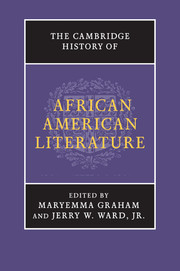Book contents
- Frontmatter
- Introduction
- PART I AFRICAN AMERICAN LITERATURE FROM ITS ORIGINS TO THE TWENTIETH CENTURY
- 1 Sounds of a tradition: the souls of black folk
- 2 Early print literature of Africans in America
- 3 The emergence of an African American literary canon, 1760–1820
- 4 Dividing a nation, uniting a people: African American literature and the abolitionist movement
- 5 African American literature and the abolitionist movement, 1845 to the Civil War
- 6 Writing freedom: race, religion, and revolution, 1820–1840
- 7 “We wish to Plead our own Cause”: independent antebellum African American literature, 1840–1865
- 8 Racial ideologies in theory and practice: political and cultural nationalism, 1865–1910
- 9 The “fictions” of race
- 10 “We Wear the Mask”: the making of a poet
- 11 Toward a modernist poetics
- PART II AFRICAN AMERICAN LITERATURE IN THE TWENTIETH CENTURY
- PART III AFRICAN AMERICAN LITERATURE AS ACADEMIC AND CULTURAL CAPITAL
- Bibliography
- Index
- References
1 - Sounds of a tradition: the souls of black folk
from PART I - AFRICAN AMERICAN LITERATURE FROM ITS ORIGINS TO THE TWENTIETH CENTURY
Published online by Cambridge University Press: 28 May 2011
- Frontmatter
- Introduction
- PART I AFRICAN AMERICAN LITERATURE FROM ITS ORIGINS TO THE TWENTIETH CENTURY
- 1 Sounds of a tradition: the souls of black folk
- 2 Early print literature of Africans in America
- 3 The emergence of an African American literary canon, 1760–1820
- 4 Dividing a nation, uniting a people: African American literature and the abolitionist movement
- 5 African American literature and the abolitionist movement, 1845 to the Civil War
- 6 Writing freedom: race, religion, and revolution, 1820–1840
- 7 “We wish to Plead our own Cause”: independent antebellum African American literature, 1840–1865
- 8 Racial ideologies in theory and practice: political and cultural nationalism, 1865–1910
- 9 The “fictions” of race
- 10 “We Wear the Mask”: the making of a poet
- 11 Toward a modernist poetics
- PART II AFRICAN AMERICAN LITERATURE IN THE TWENTIETH CENTURY
- PART III AFRICAN AMERICAN LITERATURE AS ACADEMIC AND CULTURAL CAPITAL
- Bibliography
- Index
- References
Summary
Although many African societies developed elaborate indigenous writing systems, some of which are still in active use today – as is the case, notably, with Amharic in Ethiopia – the expressive culture of the continent has been more closely associated with the phenomenon of orality. The complex linguistic situation in which over a thousand distinct languages are spoken in Africa, each with several dialects, has meant that the communicative process has been and continues to be carried out on the continent predominantly through the oral mode. This situation in itself calls attention to the universal fact that orality is the primary basis of all natural language, a given truth of nature that has determined the evolution of modern linguistics, so that writing, as a graphic representation, has come to be considered a secondary mode of language. It is of interest in this regard to note the reservations expressed by Plato in his Cratylus, with regard to what seemed to him the inauthentic nature of writing, dependent as it is on a technology for the transmission of thought, as against the immediacy of oral speech. This reservation seems to have been shared by St. Augustine, who remarks on the contrast between the fixed spatiality of writing, as opposed to the natural unfolding of oral speech in time.
It is in the perspective of the dominant role of orality in all aspects of linguistic behavior in African life and cultural expression that we need to consider its relation to those forms of the creative deployment of language that we associate with literature as a phenomenon.
- Type
- Chapter
- Information
- The Cambridge History of African American Literature , pp. 19 - 38Publisher: Cambridge University PressPrint publication year: 2011
References
- 2
- Cited by



